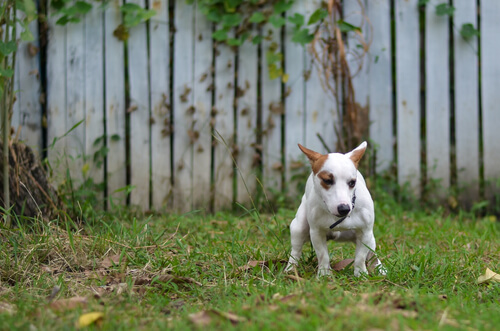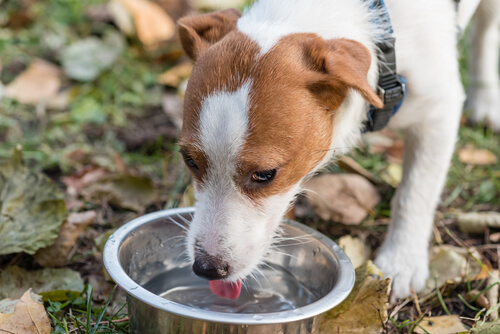How to Treat Diarrhea in Dogs

Why do dogs get diarrhea?
Different reasons can lead to diarrhea in our dogs. Just like what happens to humans, it can be more or less serious according to the root of the problem. The three main reasons are:
1. Bacteria and viruses
The intestine is inhabited by millions of bacteria that are in charge of processing food and expelling waste through feces. However, when the intestinal flora becomes unbalanced for whatever reason, diarrhea can occur.
For example, when a virus enters the body and attacks the digestive system, the colon bacteria cannot do their job. It can also happen by ingesting harmful bacteria from bad food or by suffering from certain illnesses: parvovirus, distemper, or “kennel cough.”
2. Food
Dogs are very curious, and they have a sweet tooth by nature. So once they finish eating they have no problem picking up trash or stealing something from the table. If they consume something that has gone bad, raw, or unfit for their stomach, they will probably suffer from intestinal problems, and therefore, diarrhea.

It should be pointed out that in some cases, the responsibility is the owner’s if they give bad-quality food, milk, bread or bones that have not been cooked correctly to the pet. Too much food and food allergies can also cause diarrhea.
3. Parasites
Parasites are the most common cause of diarrhea in dogs; they usually appear in the animal’s first few months of life. Even if they are vaccinated or have taken worming medication, the dog will not be 100% protected from these microorganisms.
Furthermore, there are many parasites that cannot be eliminated with preventative treatments and must be treated with antibiotics, as is the case with giardias.
Tips to treat diarrhea in dogs
Before anything else, you must be sure that it is a simple intestinal discomfort and not a disease. Pay attention to any symptoms other than diarrhea: fever, lack of energy, feces with blood, lack of appetite, or pain. In this case, you would have to take him immediately to the veterinarian.
However, if liquid excrements are the only sign that you see, but your pet still has energy and is in a good mood, then you should follow these tips:
1. Don’t give him food for 24 hours
Sometimes it’s the only thing the dog needs to balance out the quantity of bacteria in the intestines, since ingesting more food could be counterproductive. Nothing bad will happen to him if he doesn’t eat for a day, especially if he doesn’t feel well.
2. Give him a lot of water
You should never take away his water because that way you will prevent him from getting dehydrated from so many liquid bowel movements. Make sure that the water bowl is always full and that he drinks several times throughout the day.

3. Give soft foods to him
Once the fasting period has ended, and if the diarrhea has decreased, prepare a special diet for him during the next days. The food has to be easy to digest and easy on the stomach: chicken without the bones, rice, or pasta. Avoid meat, fats, milk, and dog food.
Examine the feces and the quantity of the stool until you see that it’s starting to look normal. Then he can go back to his regular food little by little. If he gets diarrhea again, take him to the veterinarian.
4. Ration the portions
When treating diarrhea in dogs you have to remember that if it were up to him, he would eat everything and in big portions. You will be responsible for thinking according to the situation and giving him food in small portions throughout the day. Instead of one meal in the morning or at night, divide it in two smaller portions.
5. Avoid diarrhea
Think about the reasons why your dog could have suffered from diarrhea: maybe it’s because you changed the brand of the dog food, maybe it’s because he ate something in the park without you realizing it, or maybe it’s because of raw food that you gave to him. Avoid these situations so that it doesn’t happen again, and you will ensure the well-being of your best friend.
Why do dogs get diarrhea?
Different reasons can lead to diarrhea in our dogs. Just like what happens to humans, it can be more or less serious according to the root of the problem. The three main reasons are:
1. Bacteria and viruses
The intestine is inhabited by millions of bacteria that are in charge of processing food and expelling waste through feces. However, when the intestinal flora becomes unbalanced for whatever reason, diarrhea can occur.
For example, when a virus enters the body and attacks the digestive system, the colon bacteria cannot do their job. It can also happen by ingesting harmful bacteria from bad food or by suffering from certain illnesses: parvovirus, distemper, or “kennel cough.”
2. Food
Dogs are very curious, and they have a sweet tooth by nature. So once they finish eating they have no problem picking up trash or stealing something from the table. If they consume something that has gone bad, raw, or unfit for their stomach, they will probably suffer from intestinal problems, and therefore, diarrhea.

It should be pointed out that in some cases, the responsibility is the owner’s if they give bad-quality food, milk, bread or bones that have not been cooked correctly to the pet. Too much food and food allergies can also cause diarrhea.
3. Parasites
Parasites are the most common cause of diarrhea in dogs; they usually appear in the animal’s first few months of life. Even if they are vaccinated or have taken worming medication, the dog will not be 100% protected from these microorganisms.
Furthermore, there are many parasites that cannot be eliminated with preventative treatments and must be treated with antibiotics, as is the case with giardias.
Tips to treat diarrhea in dogs
Before anything else, you must be sure that it is a simple intestinal discomfort and not a disease. Pay attention to any symptoms other than diarrhea: fever, lack of energy, feces with blood, lack of appetite, or pain. In this case, you would have to take him immediately to the veterinarian.
However, if liquid excrements are the only sign that you see, but your pet still has energy and is in a good mood, then you should follow these tips:
1. Don’t give him food for 24 hours
Sometimes it’s the only thing the dog needs to balance out the quantity of bacteria in the intestines, since ingesting more food could be counterproductive. Nothing bad will happen to him if he doesn’t eat for a day, especially if he doesn’t feel well.
2. Give him a lot of water
You should never take away his water because that way you will prevent him from getting dehydrated from so many liquid bowel movements. Make sure that the water bowl is always full and that he drinks several times throughout the day.

3. Give soft foods to him
Once the fasting period has ended, and if the diarrhea has decreased, prepare a special diet for him during the next days. The food has to be easy to digest and easy on the stomach: chicken without the bones, rice, or pasta. Avoid meat, fats, milk, and dog food.
Examine the feces and the quantity of the stool until you see that it’s starting to look normal. Then he can go back to his regular food little by little. If he gets diarrhea again, take him to the veterinarian.
4. Ration the portions
When treating diarrhea in dogs you have to remember that if it were up to him, he would eat everything and in big portions. You will be responsible for thinking according to the situation and giving him food in small portions throughout the day. Instead of one meal in the morning or at night, divide it in two smaller portions.
5. Avoid diarrhea
Think about the reasons why your dog could have suffered from diarrhea: maybe it’s because you changed the brand of the dog food, maybe it’s because he ate something in the park without you realizing it, or maybe it’s because of raw food that you gave to him. Avoid these situations so that it doesn’t happen again, and you will ensure the well-being of your best friend.
This text is provided for informational purposes only and does not replace consultation with a professional. If in doubt, consult your specialist.








